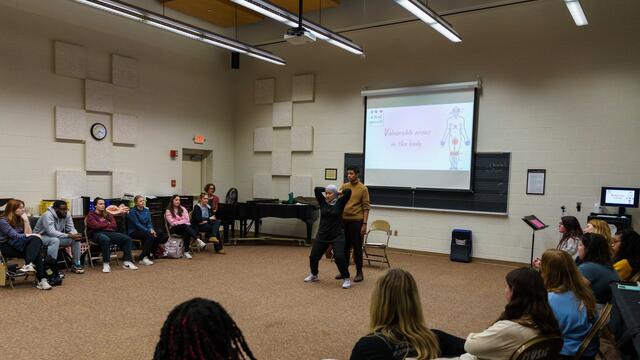Students wrestle with the ‘Power of Pretty’ in experiential Philosophy class
In Associate Professor of Philosophy Elizabeth Tyler’s course The Power of Pretty, students grapple with the philosophy of beauty and femininity. Not just about abstract theories, the course has an energetic experiential learning component with self-defense lessons to put philosophy to the test.

Representing many different majors, students in The Power of Pretty course have the opportunity to explore philosophy in a new way and apply it to their areas of study. From careers in social work to black belts in tae kwon do, student's goals are supported through the course's experiential learning, a core component of the McDaniel Plan.
In the Philosophy course The Power of Pretty, Associate Professor Elizabeth Tyler has students wrestle with philosophical concepts through the unique lens of self-defense training.
After students examine how Western philosophy has defined femininity and beauty throughout history, they participate in a series of workshops with the D.C.-based organization Defend Yourself to learn self-defense maneuvers, de-escalation, and empowerment exercises.
“Usually in Philosophy classes we focus more on patterns of thought, but a discussion around how women’s worth is often tied to their bodies can’t go as far as I’d like it to unless we have embodied experiences,” Tyler says.
While other Philosophy courses at McDaniel include opportunities to see the liberal arts in action, like field trips to Baltimore to visit the Walters Art Museum or the Buddhist Kadampa Meditation Center, this is the first Philosophy course to offer an experiential learning (EXP) credit. EXP credits are a core part of the McDaniel Plan, which invites students to gain real-world experience from courses, research, internships, leadership, and study abroad.
“The experiential opportunity in this Philosophy course shows students that sometimes, to understand philosophical ideas, we can’t just think about them, we have to live them,” she says. Tyler was inspired to add experiential learning to the course by her own experience in a self-defense class when she was pursuing her Ph.D. in Philosophy.
“The experiential component to this class made me want to take it even more,” says sophomore Paige Felter, who is a Philosophy and Psychology dual major. “Learning about historical philosophical ideas that are still in play today is really interesting, and the self-defense lessons are breaking those historical barriers by encouraging women to speak up for themselves.”
“The experiential opportunity in this Philosophy course shows students that sometimes, to understand philosophical ideas, we can’t just think about them, we have to live them."
Performing self-defense maneuvers with philosophy in mind allows students to confront assumptions about the strength and capabilities of women. The class reads texts written on female athletes and women who engage in self-defense training and how their training doesn’t just prepare them to defend themselves but also changes the way that they think about their own possibilities.
For junior Josie Otremba, who has a black belt in tae kwon do, the class was a chance to learn self-defense for public settings and to explore topics that interest her as a History major with a minor in Philosophy. “I enjoy learning feminist philosophy because it’s so oftentimes overlooked,” she says.
Social Work junior Daryn Gluck sees the course as a way to prepare for her future career, since she plans to specialize in supporting victims of domestic violence. “As a social worker dealing with domestic violence, I want to be able to help people as much as I can with my knowledge of empowerment and self-defense.”
The experiential component offers a unique learning opportunity for every student in the room. “Even for the men in the class, the self-defense exercises can be transformative and teach boundary setting,” Tyler says.
Sophomore Natalie Litvak took the class because of her Philosophy and Political Science majors, but also because of the instructor. “I’ll take any class with Dr. Tyler. She’s a very patient teacher and she really cares about what she talks about and teaches. In her, I have someone that I can look up to, especially with this being a class about feminism,” she says.
“As a social worker dealing with domestic violence, I want to be able to help people as much as I can with my knowledge of empowerment and self-defense.”
“In the self-defense portion, you’re able to see that no matter if you're big, small, shy, timid, or outgoing, you still have power within you,” Litvak adds.